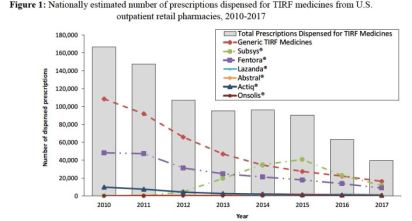Influenza Virus Vaccine for the 2018-2019 Season
Flu vaccine lots for 2018-2019 season have been released by FDA and are available for distribution by the manufacturers
- Afluria, Afluria Quadrivalent, Fluad, Fluarix Quadrivalent, Flucelvax Quadrivalent, Flublok Quadrivalent, FluLaval Quadrivalent, Fluzone Quadrivalent
Selected by FDA’s Vaccines and Related Biological Products Advisory Committee (VRBPAC)
- Reviewed and evaluated surveillance data related to epidemiology and antigenic characteristics of recent influenza isolates, serological responses to 2017-2018 vaccines, and the availability of candidate strains and reagents

Continued, careful oversight of the REMS associated with transmucosal immediate-release fentanyl products
FDA Public Meeting with Drug Safety and Risk Management Advisory Committee (DSARM) and the Anesthetic and Analgesic Drug Products Advisory Committee (AADPAC)
- Review data from Risk Evaluation and Mitigation Strategy (REMS) with Elements to Assure Safe Use (ETASU) for transmucosal immediate-release fentanyl (TIRF) products
- Discuss findings from assessments conducted by manufacturers and additional data about their use patterns and adverse events
- Provide transparency around effectiveness of the REMS and whether changes might be necessary.
Significant decline in prescribing of TIRF products since REMS implemented
- How the TIRF REMS has affected the prescribing patterns
- How the TIRF REMS can better promote safe prescribing
- Reliability of current trend information, and how to collect even more accurate data

FDA issues policy to facilitate the use of electronic health record data in clinical investigations
Publication of Guidance entitled, “Use of Electronic Health Record Data in Clinical Investigations; Guidance for Industry.”
- Recommendations for sponsors, clinical investigators, contract research organizations (CROs), institutional review boards (IRBs), and other interested parties on the use of electronic health record (EHR) data in FDA-regulated clinical investigations
- Goal to modernize and streamline clinical investigations through the use of EHR data
- Inclusion of real world data in clinical investigations
- Advance interoperability and integration of EHR and Electronic Data Capture systems.

FDA supports critical research to spur innovation for continuous manufacturing technology to support and advance drug and biologics development
Under Emerging Technology Program, FDA awarded three grants, to study and recommend improvements for continuous manufacturing of drugs and biological products, innovative monitoring and control techniques
- Rutgers University: Implementation in Continuous Pharmaceutical Manufacturing
- Massachusetts Institute of Technology: Smart Data Analytics for Risk Based Regulatory Science and Bioprocessing Decisions
- Georgia Institute of Technology: Continuous Synthesis, Crystallization, and Isolation (CSCI) of an API: Process Model-Controlled Enzymatic Synthesis of Beta-Lactam Antibiotics

New steps the agency is taking to support the development of novel nicotine replacement drug therapies to help smokers quit cigarettes
Aim to significantly reduce the rate of tobacco-related disease and death
- Nicotine replacement therapy (NRT) products regulated as new drugs, is a critical part of overall strategy on nicotine
- New kinds of NRTs – with different characteristics or routes of delivery – can offer additional opportunities for smokers to quit combustible tobacco
- Nicotine Steering Committee has been evaluating new, evidence-based opportunities to advance therapeutic nicotine products for combustible tobacco product cessation
Two draft guidances aimed at supporting the development of novel, inhaled nicotine replacement therapies that could be submitted to the FDA for approval as new drugs
- Nonclinical testing of orally inhaled nicotine-containing drug products
- Framework for new potential clinically relevant outcomes for smoking cessation products
Image credits: FDA, CDC
